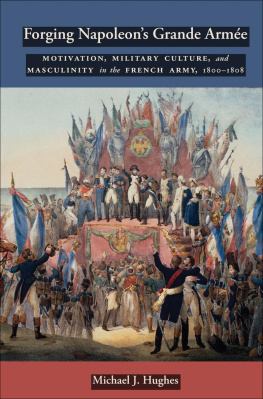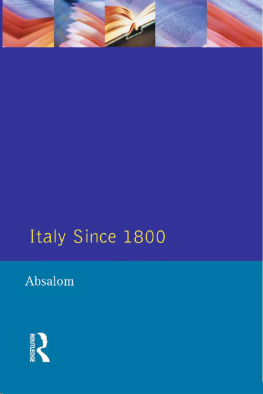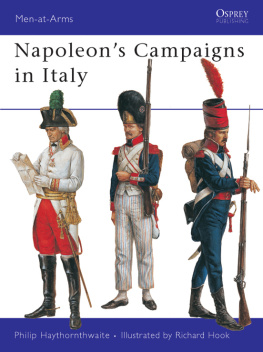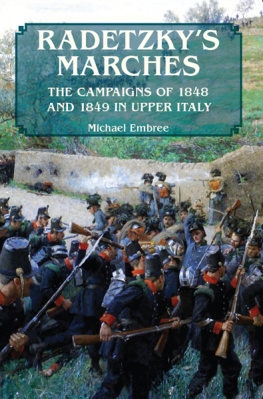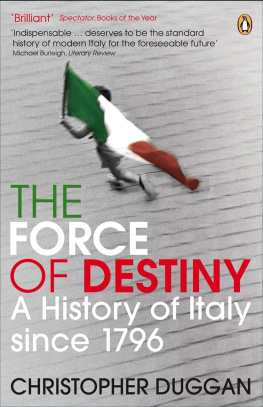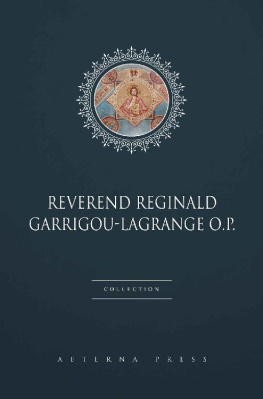This edition is published by PICKLE PARTNERS PUBLISHING
Text originally published in 1912 under the same title.
Pickle Partners Publishing 2011, all rights reserved. No part of this publication may be reproduced, stored in a retrieval system or transmitted by any means, electrical, mechanical or otherwise without the written permission of the copyright holder.
Publishers Note
Although in most cases we have retained the Authors original spelling and grammar to authentically reproduce the work of the Author and the original intent of such material, some additional notes and clarifications have been added for the modern readers benefit.
NAPOLEON'S CAMPAIGNS IN ITALY
1796-1797 and 1800
BY
BRIGADIER-GENERAL R. G. BURTON
SPECIAL CAMPAIGN SERIES. No. 15
Above all, for Empire and Greatness, it importeth most that a Nation do profess arms as their principal honour, study and occupation.
FRANCIS BACON .
PREFACE
THE historian Gibbon tells us that war and the administration of affairs are the principal subjects of history. In the opening campaign of Napoleon Bonaparte we see the conduct of events by a master of both. Especially instructive to the soldier is the first series of operations conducted by the greatest master of the art of war, whose very name sounds like a trumpet-call, and whose genius illuminates one of the most lurid and marvellous epochs in the history of the world.
In the Middle Ages and until the advent of Napoleon, the art of war as exemplified in the campaigns of Alexander and Caesar had been neglected or forgotten. War had become a pageant, a stately ceremonial, governed by none of those logical principles which are based on the foundations of nature and of reason. It had degenerated into a series of manoeuvres, frequently carried out to avoid combat, while lengthy sieges and the occupation of towns and territory were regarded as the objects of strategy, to the neglect of the true and proper objectthe destruction of the enemy's armed forces.
It fell to Napoleon Bonaparte to deduce from the experience of history and to illustrate in the practice of war the whole art of military operations, based on immutable principles, and exemplified in the annals of the world.
The first campaign in which he exercised supreme command consequently marks the opening of an epoch in the art of war, and serves as a lasting example to those who would scale the glittering pinnacle of military fame. Had his career ended at Rivoli, this campaign alone would have sufficed to entitle him to that deathless fame of which he said: I hold the immortality of the soul to be the remembrance we leave behind us in the minds of men. This thought is an inspiring one. It were better never to have lived at all than to leave no trace of one's existence behind.
Contents
NAPOLEON'S CAMPAIGNS IN ITALY
PART I 1796-1797
CHAPTER I - CHARACTER OF THE COUNTRY AND OPPOSING FORCES
Theatre of OperationsCharacter of the opposing ForcesThe French ArmyFrench CommandersNapoleon Bonaparte MassenaOther CommandersThe Austrian Army Austrian Generals Clausewitz' Comparison between Napoleon and BeaulieuThe Piedmontese Army
THE theatre of operations in Italy in 1796 lay between two great mountain ranges in country drained by the Po and Theatre of its tributaries which, fed by melting snows, Operations descend from the lofty lacustrine regions of the Alps in the north, and from the lesser range of the Apennines in the south. Swollen by these many waters, the Po flows eastward through fertile plains to empty itself into the Adriatic Sea. Beyond the Po, in Venetian territory, the considerable streams of the Adige, the Brenta, and the Piave have their own terminations in the Adriatic. It will be seen, then, that the course of the rivers that influenced the campaign was north and south, but the Po, running almost due east from its source to the west of Turin, was parallel to the general line of operations.
Fed by the melting of the snows, these rivers roll in turbid floods across the plains, or in lesser streams according to the season of the year. At times and in places they are fordable; generally they are passable only by bridges and boats; and Napoleon, having no pontoon train, frequently found in them formidable obstacles, as will be seen during the course of this narrative.
The mountain slopes rise abruptly from this low-lying country, the whole of which is a level plain of wonderful richness and fertility, thickly populated and containing many large and wealthy cities.
The narrow strip of coast between the Maritime Alps, the Apennines, and the sea, formerly known as Liguria, is entirely mountainous, occupied by offshoots from the main ranges, which descend to the Mediterranean coast. The mountain slopes are fertile; the valleys, traversed only by rushing torrents which cannot assume any consider able size in so short a course, are cultivated and occupied by villages. The northern Apennines have some lofty peaks, rising to a height of seven thousand feet above the sea.
The roads in those days were neither as numerous nor as good as they are in our time. At the opening of the campaign the main line of communication for the French was the coastal road from Genoa to Nice, narrow and rugged in places, situated unfavourably in prolongation of their left flank, and under fire of ships which had command of the sea. The Apennines were traversed by some difficult roads and a number of paths. In the plains of Piedmont and Lombardy were good roads connecting the principal towns, as well as navigable rivers. The lines of communication of the Austrians were therefore in no way difficult, and the rich plains which they traversed rendered supply a comparatively easy matter.
Politically, the area of operations was divided into various states and principalities. There was the kingdom of Piedmont; Lombardy; the dukedoms of Parma and Modena; the states of Genoa and Venice, nominally republics, in reality oligarchies whose despotism, like that of many so-called democratic governments, was, if possible, more tyrannical than the autocracies of unlimited monarchies; and the states over which the Pope had both spiritual and temporal power. The inhabitants were mainly neutral, their sympathies varying with the changing' fortunes of war, but many were inspired by the new ideas ' propagated throughout Europe by the French Revolution.
Character of the Opposing Forces
For a full comprehension of the operations of war it is necessary to have some knowledge of the opposing forces, their strength, their organisation, their training and their armament. More than this, the psychology and the characteristics of the peoples of which armies are composed exercise a great influence on the course of events; whilst perhaps more important than all is the character of the higher leaders; for, as Von Moltke said, in war everything is uncertain from the beginning except the amount of will-power and energy with which the Commander-in-Chief himself is endowed.
The French Army
Napoleon's Army of Italy was formed from the French National Guard, called into being by the National Assembly in 1792. This National Guard was a force of two or three million citizens who, although armed only with pikes, furnished the armies of the Revolution. Obligatory service was established for all males between the ages of eighteen and forty, and systematic conscription was instituted in 1793, when the methods of Carnot, the great Minister of War, were en forced by the Committee of Public Safety. By this means the Republic was able to put 600,000 men into the field.




